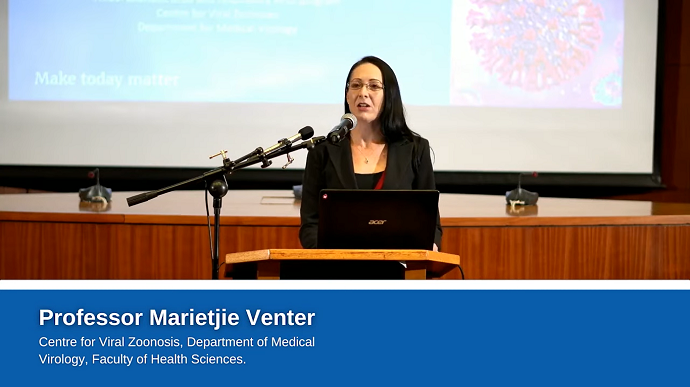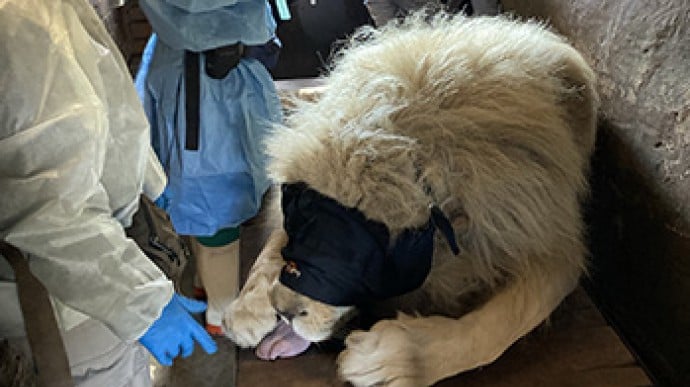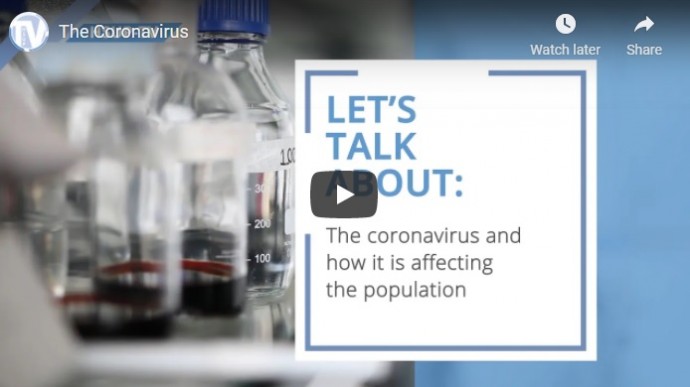Professor Marietjie Venter joined the University of Pretoria (UP) in 2006 and established a research programme on neurological arboviruses and respiratory viruses, in the Department Medical Virology.
In 2009, she became Co-director of the Centre for Respiratory Diseases and Meningitis at the National Institute for Communicable Diseases (NICD) of South Africa. She then worked for two years for the US Centers for Disease Control and Prevention, and the Global Disease Detection Centre in South Africa as One Health and Emerging Disease Programme Director. Prof Venter maintained a part-time joint appointment with UP to continue her research programme and supervised postgraduate students between 2009 and 2016, first as an associate professor and later as a full professor. In 2016 she took up a full-time position as a full professor in medical virology and as Head of the Zoonotic Arbo- and Respiratory Virus Programme (ZARV).
Prof Venter holds a BSc in Molecular Biology, Genetics and Microbiology from UP and a PhD in Medical Virology from the University of the Witwatersrand (2003) with a focus on the respiratory syncytial virus (RSV). She also received postdoctoral training on the West Nile virus at the National Institute for Allergy and Infectious Diseases in the US (2003).
Prof Venter established a One Health programme in the Department of Medical Virology that focuses on detecting and describing emerging and zoonotic vector-borne and respiratory viruses. There is close collaboration between the ZARV medical virology group in the medical school, veterinarians, veterinary pathologists and clinicians as well as entomologists. This collaboration has been extremely productive in describing the molecular epidemiology of vector-borne and respiratory viruses.
The Department of Medical Virology has a state-of-the-art biosafety level 3 laboratory, which was funded and commissioned in 2011, and which has been the core infrastructure for Prof Venter’s research programme. She co-founded the steering committee of the Centre for Viral Zoonoses, which was launched around this infrastructure in 2015 and stretches across three faculties.
In terms of far-reaching impact, Prof Venter says her research programme focuses on developing diagnostic tools and syndromic surveillance programmes for detecting novel and common pathogens, discovering new viruses, and defining the importance of zoonotic and human viruses with epidemic and pandemic potential. Vector-borne viruses associated with neurological symptoms – such as the West Nile and Zika viruses as well as respiratory viruses such as influenza A and coronaviruses – have been some of the most important emerging epidemic- and pandemic-prone viruses. “Our capacity to detect and respond to emerging diseases using a One Health approach and defining the clinical epidemiology and genomics has been very topical during the COVID 19 pandemic,” she says.
Since 2020, Prof Venter has been part of several COVID-19 investigations, specifically the genomic surveillance network with the University of KwaZulu-Natal as well as the National Health Laboratory Service, NICD, the Universities of Cape Town and the Free State. Apart from working closely with UP’s Faculty of Veterinary Science, her research programme also works with clinicians in Kalafong and Steve Biko hospitals to detect acute febrile disease of unknown origin, respiratory viruses and zoonotic infections.
Prof Venter holds the position of vice-president for Africa for the World Society of Virology and is a member of the international One Health Platform Scientific Advisory Board. She is the principal investigator for a study on febrile disease of unknown origin with or without neurological signs for the African network for improved diagnostics and epidemiology of common and emerging viruses. In addition, she is the principal investigator for South Africa on the Long-term Europe-African Research Network (LEARN) study of the LEAP-Agri Initiative, which is funded by the EU and administered by the National Research Foundation. It is a One Health initiative for the development of molecular and serological tools for the surveillance of arboviruses in animals and human, and is being conducted in collaboration with Wageningen University in the Netherlands and the Friedrich-Loeffler Institut in Greifswald, Germany.
Over the past year, Prof Venter’s programme took up the ANDEMIA respiratory virus work package at UP in collaboration with the NICD and the Robert Koch Institute in Germany. The ANDEMIA network study has allowed the researchers to carry out active surveillance and define the correlates of disease for both zoonotic and common pathogens. “We obtained additional funding through the G7 as part of the ANDEMIA grant to investigate COVID-19 genomics, seroprevalence and infection risk in healthcare workers as well as co-infections. We are also investigating reverse zoonotic transmission from humans to wildlife.”
Dutch virologist Dr Ab Osterhaus, founder of the One Health Platform, inspires Prof Venter’s research efforts. He and his team described several viruses including the original SARS coronavirus. He also actively involves many young scientists such as Prof Venter in international networks to promote One Health aimed at detecting and preventing potential zoonotic disease outbreaks and pandemics. Prof Venter says she has also been inspired by several African scientists who have dedicated their lives to fighting infectious diseases in their home countries.
The professor says that she has had several role models and mentors throughout her career, but that Prof Barry Schoub, former director of the NICD, stands out for her. He dedicated his career to fighting infectious diseases through research, by supporting his staff and by advising policy nationally and globally. Prof Schoub was both Prof Venter’s PhD mentor and supervisor at the NICD and has maintained an interest in her career.
She has always been motivated to improve the lives of humans and animals by investigating the viral causes of respiratory and neurological infections through virus discovery, molecular epidemiology, pathogenesis research and the development of diagnostic tools and preventative strategies such as vaccines.
“I have been involved in vaccine research over the years, and have found it to be very rewarding,” she says. “For instance, the West Nile virus vaccine was licensed for horses after we proved that it protects against lineage two variants that are dominant in South Africa.” She says she would like to focus some of her work in this area again, trying to find vaccines for viruses that have the potential to cause epidemics and spread internationally.
Prof Venter says her research matters because it focuses on improving the ability to detect, respond and control important viruses such as RSV, influenza, COVID-19, the West Nile virus and emerging arboviruses, thereby contributing to the international health regulations for countries to respond to zoonotic viruses and the United Nations Sustainable Development Goals 3: Good health and well-being.
For school learners or undergraduates who are interested in her field of study, Prof Venter says that a career in virology offers opportunities to work in the field of public health or as a laboratory scientist internationally or locally. She adds that virologists get to investigate unsolved diseases, discover new viruses and develop technologies that can save lives and improve health for humans and animals.
In her spare time, Prof Venter is a competitive dressage rider, a member of the South African Warmblood Society and a breeder of warmblood horses.

 Lecture
Lecture
 Story
Story
 Story
Story
 Video
Video
 Talking Point
Talking Point
Get Social With Us
Download the UP Mobile App